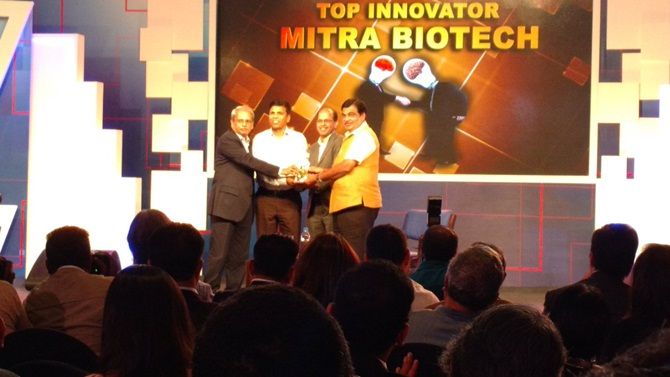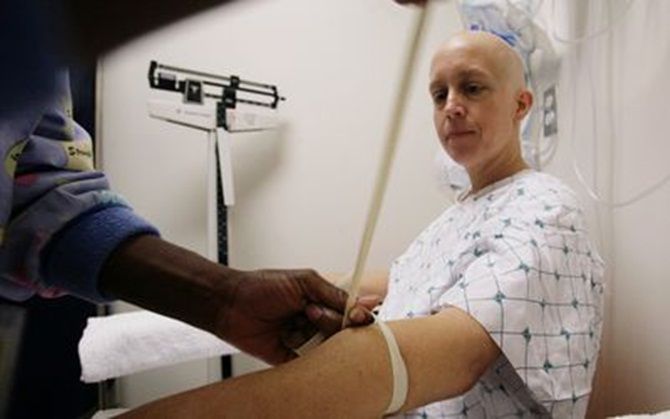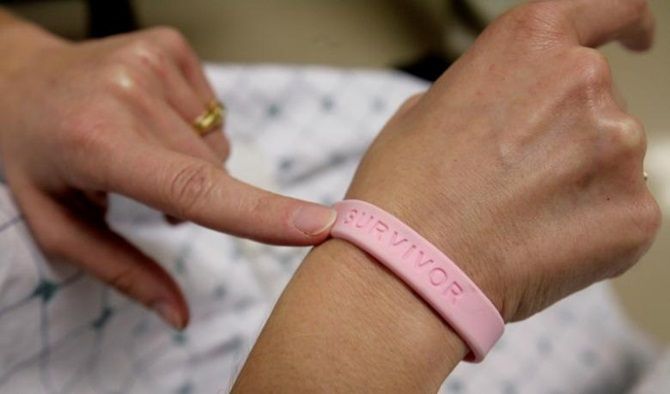 | « Back to article | Print this article |
Mitra Biotech’s personalised cancer therapy could be a game changer in the field of cancer medicine, find Veena Mani & Ranju Sarkar.

Seventeen year-old Alex’s soccer career could have ended, but for a drug that helped shrink his gastrointestinal stromal tumour (GIST).
His father tried the best of doctors, before turning to cancer diagnostics firm Mitra Biotech.
It identified two drugs for Alex - an experimental one and the other which was commercially available but not generally given for GIST - that helped heal his symptoms in three cycles of treatment.
The Boston and Bengaluru-based start-up, which raised $27.4 million in funding last month, offers personalised cancer therapy, a possible game changer.
It tries to address three key issues in cancer treatment: Giving the patient the right drug at the right moment, toxicity and costs.
It also helps pharmaceutical companies develop new drugs by testing these on tissues before clinical trials.

Concept
In treating cancer, the success rate tends to be low.
Doctors try something for two or three months; if it doesn’t work, they try the next treatment.
The patient might not benefit from a treatment but often suffers from its toxicity.
Mitra’s idea is that instead of doing a trial and error on the patient, do so on the cancer tissue.
Doctors need to do a biopsy of the patient’s tumour and send it to Mitra’s labs, with the blood sample.
It recreates the tumour micro environment in its labs, tests drugs or combinations on it, and tells the physician within seven days which drugs or therapy would work on the patient and which wouldn’t.
‘‘Our aim is to reach the right drug to the right patient, at the right time,” says Mallikarjun Sundaram, co-founder and chief executive.
It also helps pharma companies developing new drugs in the pre-clinical trial stage.
Only 10 per cent of drugs which go through phase-1 clinical trials make it to the market.
Mitra offers to test these new ones on the cancer tissues, tell which drugs work on what type of patients and help scientists in these firms evolve the most optimal clinical trial strategy.
‘‘We’d like to be global leaders for this kind of therapy selection in oncology,’’ says Sundaram, who has a doctorate in bio-chemistry.
He co-founded Mitra with cancer biologist Pradip K Majumder in 2010, and raised $15 million in Series-A funding between 2010 and 2013.
This is the second start-up for Sundaram; he also co-founded Boston-based Momenta Pharmaceutical. Mitra is based in Boston and has a lab each in Bengaluru and Boston, which have 25 and 20 people, respectively.
 The opportunity
The opportunity
Sundaram says the potential market for precision diagnostics in oncology is $600 billion.
It works only through hospitals, having signed up with a few, like Fortis and Apollo in Delhi. The Boston lab is awaiting a regulatory approval, which will come by October. It will allow Mitra to get business from hospitals in the US and Europe.
‘‘We are trying to create a pull by presenting academic papers at conferences, helping physicians know and evaluate our product,’’ says Sundaram.
It’s not going to be easy. Mitra will have to do a lot of concept selling and show results before physicians change their practice.
Shishir Shetty from the oncology department at Fortis Hospitals says the product will take at least five years to prove itself in India.
‘‘Getting hospitals to use any technology solution is challenging, unless you can provide them with strong clinical evidence and a fundamentally strong cost-benefit case,’’ says Mahendran Balachandran, partner, Accel Partners, an early investor in Mitra.
‘‘We believe Mitra will be able to offer both — they are already in commercial mode in India and we should see them ramping up in the coming years.’’
There are companies like Genomic Health and Foundation Medicine, which use genomics to recommend the treatment protocol.

Mitra’s approach is more holistic and personalised. Other companies in this field are also trying to match up but Mitra is ahead of the curve, thanks to its innovative approach to solving this problem.
‘‘It has not aligned itself to one set of technologies but provides a more holistic view of the problem and the solution set,’’ says Accel’s Balachandran.
Mitra has two businesses, clinical diagnostics and bio-pharma. The latter is where it collaborates with pharma majors to evolve their clinical trial strategy.
This business accounts for 90 per cent of its revenue, with the diagnostics business bringing the rest.
As it ramps up, it expects the two businesses to contribute equally in two to three years but, eventually, Mitra expects the share of diagnostics and bio-pharma to reverse in the next five years.
It made $2 million in revenue last year, and is targeting two-fold growth.
“The focus is on developing technology further, on commercialisation, putting in commercial infrastructure and people in place, while we work with doctors,’’ says Sundaram.
In August, Sequoia Capital India and Sand Capital Ventures backed its Rs 183-crore fundraising.
‘‘When we first invested in Mitra six-odd years back, we believed in their vision of being able to personalise cancer therapy and provide doctors with a tool to provide better patient outcome,’’ says Accel’s Balachandran.
Amit Varma, Managing Partner at Quadria Capital Investment Advisors, says Mitra’s business model is high-risk but once it proves its technology, it can emerge as a global giant.

EXPERT TAKE
Mitra’s idea is that instead of treating the patient on trial and error, it is doing the trial and error on the tissue.
For this, the physician needs to take a biopsy of the patient's tumour and send it to Mitra.
It will do different treatment on the tissue and find which treatment works.
It is able to predict positive results in 90 per cent of the cases, and negative results (if a treatment is not working) in all the cases.
If future studies and experience give similar results, it will be a game changer in cancer medicine.
Mitra will have to do a lot of concept selling to change the thinking of physicians - they will change their practise if they see the benefits.
There's a good chance that hospitals in the US and Israel will adopt the product soon, after India.
Mitra will have to figure out the logistics - how to have the tumour tissue delivered to it from the hospitals.
Raanan Berger, director, Chaim Sheba Medical Center, Israel. He is an international expert on precision medicine diagnostics.
FACT BOX